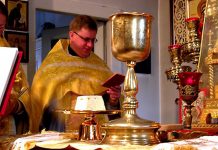The Distinguishing Marks of a Work of the Spirit of God by Jonathan Edwards is one of the great classics of revival literature. A key figure of the Great Awakening, Edwards wrote this important discourse in 1741 just after the revival had reached its peak. In 2000 R.C. Sproul wrote an Introduction to a version of this classic work that had been edited and modernized by Archie Parrish. This Introduction effectively compares Edwards’s nineteenth century to our society and explains the importance of Edwards’ treatise.
*****
Revival and Reformation
Post tenebras lux … “After darkness, light.” So read the motto of the Protestant Reformation of the sixteenth century. The titanic theological struggle of that era was a fight to bring the Gospel into the full light of day after years of being consigned to obscurity to the point of eclipse beneath the umbra of the sacerdotal supplanting of it by Rome.
With the rescue of the Gospel from darkness and distortion, a revival was evoked that transcended any revival of faith witnessed either by previous or subsequent periods of Christian history. The Reformation was not merely a Great Awakening; it was the Greatest Awakening to the true Gospel since the Apostolic Age. It was an awakening that demonstrated the power of God unto salvation.
It is noteworthy that this period in history is commonly referred to as the Reformation and not the Revival. What is the difference between revival and reformation? As the etymologies of the words suggest, revival describes a renewal of spiritual life, while reformation describes a renewal of the forms and structures of society and culture. It is not possible to have true reformation without first having true revival. The renewal of spiritual life under the power of the Holy Spirit is a necessary condition for reformation but not a sufficient condition for it. Therefore, though it is not possible to have reformation without revival, it is possible to have revival without reformation. Why is that the case? There are at least two reasons. The first is that revival brings with it the conversion of souls to Christ, who are at the moment of conversion spiritual babes. Infants have little impact on the shaping of cultural institutions. It is when vast numbers of converted people approach maturity in their faith and sanctification that the structures of the world are seriously challenged and changed. If vast numbers of people are converted but remain infantile in their spiritual growth, little impact is made by them on society as a whole. Their faith tends to remain privatized and contained within the confines of the arena of mere religion.
The second reason concerns the scope and intensity of the revival. If the revival is limited in scope and intensity, its impact tends to be restricted to a small geographical area and also tends to be short-lived. Yet it may have rivulets of abiding influence into future generations. Such a rivulet is the work of Jonathan Edwards presented and discussed in this book. The Great Awakening that occurred in New England in the mid-eighteenth century has left an indelible mark on America, though that mark has faded dramatically over time. No one would today confuse New England with a mecca of vibrant gospel faith. Nor is there any danger of the works of Jonathan Edwards pushing any contemporary authors off the New York Times’s list of best sellers.
Nevertheless, the influence of Edwards as well as that of the magisterial reformers Luther and Calvin continue to this day. Their words are still in print, and there is a cadre of Christians who devour their writings. The things of which those men of God wrote maintain a vital relevance down to our own day.
William Cooper’s original preface to Edwards’s The Distinguishing Marks describes the state of the church prior to the Great Awakening. It could just as well serve as a commentary for our own times.
Continued in Part Two
*****
Excerpted from R.C. Sproul’s Introduction to The Spirit of Revival, edited by Archie Parrish.
www.ligonier.org
Spirit Of Revival Chords (Transposable):
Verse 1
D Bm7
Through the fire and water, You have faithfully brought us
G Em7 G
To this place of abundance where Your face shines upon us;
D Bm7
You give abundant showers of grace to refresh Your weary people
G
Stir us again for revival,
Em7 G D
That Your ways be known on the earth, Lord. Chorus
Bm7 G
So let the rains pour down harder, let the river run wider,
Em7
Let the winds carry farther, let the fire burn brighter,
G D Bm7
Spirit of revival; let the rains pour down harder,
G
Let the river run wider, let the winds carry farther,
Em7
Let the fire burn brighter.
G Em7
Spirit of revival, let it roll like the smoke,
D/F#
Let it roll like the sea
G Em7 D Bm7 G Em7
Let the Spirit of revival come roll over me, roll over me. Verse 2
G G A D Bm7
The Lord announces His Word and His people proclaim it;
G Em7
And this move of His Spirit, well no words can describe it,
G D
But no darkness can hide it.
Bm7
So the land will yield its harvest
G
And the Lord God will bless us.
And the whole earth will fear Him,
Em7 G D
The kings will revere Him, and glorify Jesus. Ending
G G A D
worshipchords.com
CHARLES GRANDISON FINNEY was probably the greatest revival preacher there ever was. He began as a solicitor and after his conversion to an evangelist, pastor, professor of theology and author, he was used for his whole life as an instrument for new revivals. His present extracts are excerpts from the second and fourth of his famous speeches about revivals, held in New York in the winter of 1834/35. These speeches were later published and probably form one of the most systematic accounts about revival.
There are two kinds of means requisite to promote a revival: the one to influence men, the other to influence God. The truth is employed to influence men, and prayer to move God. When I speak of moving God, I do not mean that God’s mind is changed by prayer, or that His disposition or character is changed. But prayer produces such a change in us it renders it consistent for God to do as it would not be consistent for Him to do otherwise. When a sinner repents, that state of feeling makes it proper for God to forgive him. God has always been ready to forgive him on that condition, so that when the sinner changes his feelings and repents, it requires no change of feeling in God to pardon him. It is the sinner’s repentance that renders His forgiveness proper, and is the occasion of God’s acting as He does.
So, also, when the children of God pray fervently they are in the right inner condition to enable God to hear them. He was always prepared to bless those who have a right heart attitude and who pray in the right way.
Prayer is in a chain of causes which lead to a revival, and is a cause which is as important as the proclamation of the truth. Many zealously preached the gospel to cause people to turn around but have laid too little weight on prayer. They preached eagerly, talked to individuals, and handed out leaflets but, to their surprise, with little success. The reason why they could not achieve more was because they neglected the other form of support, which is fervent prayer. They forgot that the truth itself has no effect without the Spirit of God.
Sometimes it happens that those who are mostly involved with the spreading of the truth do not dedicate themselves to prayer in the same proportion. This is terrible unless they have a spirit of prayer, or unless someone else upholds them in prayer; otherwise, the preaching of the Truth only strengthens the heathen in their unrepentant attitude.
“In this Revival, as in previous ones, a sincere spirit of prayer prevailed. We had prayer meetings in different houses every day at 11 o’clock.
I remember that in one of these meetings a Mr S., who was a teller in the town bank, was so burdened by the spirit of prayer that after the meeting was finished (we had all knelt while we prayed) he was not able to get up off his knees.
He stayed on his knees weeping in agony for souls. He said “Pray for Mr…..”, who was the director of the bank where he worked. The director was a wealthy, unconverted man.
When the others saw that his soul suffered birth pains for this man, the others knelt down and wrestled in prayer for his conversion. As soon as Mr S.’s mind was peaceful enough that he could go home, we all withdrew; soon afterwards the bank director expressed his hope in Jesus Christ. Until then, I think, he had never been to any meetings, and it was not known that he was ever concerned about his salvation.
But prayer took over and soon God took the case in His hands”.
This remark was made by Finney in connection with his account of the Revival in Troy, which began in 1826 in his “Memoirs” (London, 1876, pages 104-5).
A revival may be expected when Christians have a spirit of prayer for a revival. That is, when they pray as if their hearts were set upon it. Sometimes Christians are not engaged in definite prayer for a revival, not even when they are warm in prayer.
Their minds are upon something else; they are praying for something else – the salvation of the heathen and the like – and not for a revival among themselves. But when they feel a want of revival, they pray for it; they feel for their own families and neighbourhoods; they pray for them as if they could not be denied.
What constitutes a spirit of prayer? Is it many prayers and warm words? No. Prayer is the state of the heart. The spirit of prayer is a state of continual desire and anxiety of mind for the salvation of sinners. It is something that weighs them down. It is the same, so far as the philosophy of minds is concerned, as when a man is anxious for some worldly interest. A Christian who has this spirit of prayer feels anxious for souls. It is the subject of his thoughts all the time, and makes him look and act as if he had a load on his mind. He thinks of it by day, and dreams of it by night. This is properly “praying without ceasing”. His prayers seem to flow from his heart liquid as water: “O Lord, revive thy work!”
Sometimes this feeling is very deep; persons have been bowed down so that they could neither stand nor sit. The feeling is not always as great as this, but such things are much more common than one would expect. In the great Revivals in 1826, they were common. This is by no means enthusiasm. It is just what Paul felt when he said: “My little children, of whom I travail in birth…
“
This travail of soul is that deep agony which persons feel when they lay hold on God for such a blessing and will not let Him go until they receive it. I do not mean to be understood that it is essential to a spirit of prayer that the distress should be so great as this. But this deep, continual, earnest desire for the salvation of sinners is what constitutes the spirit of prayer for a revival.
When this feeling exists in a church, unless the Spirit is grieved away by sin, there will infallibly be a conversion of sinners to God. This burning desire increases more and more until revival comes…
Generally there are but few professors of religion that know anything about this spirit of prayer which prevails with God. I have been amazed to see such accounts as are often published about revivals, as if the revival had come without any cause – nobody knew why or wherefore. I have sometimes inquired into such cases, when it had been given out that nobody knew anything about it, until one Sabbath they saw in the face of the congregation that God was there; or they saw it in their conference room, or prayer meeting, and were astonished at the mysterious sovereignty of God in bringing in a revival without any apparent connection with means.
Now mark me! Go and inquire among the obscure members of the church, and you will always find that somebody had been praying for revival, and was expecting it – some man or woman had been agonising in prayer for the salvation of sinners until the blessing was gained. This person perhaps woke everyone out of their sleep so that they jumped up, rubbed their eyes, and could not quite understand where the sudden excitement came from. Even if only so few know of the responsibility of a revival, you can be assured that someone held watch on the tower and did not cease with begging until the blessing was there. Generally, a revival is more or less extensive, as there are more or less persons who have the spirit of prayer.
by Charles Finney
Source: Revival Movement Association
www.cai.org











